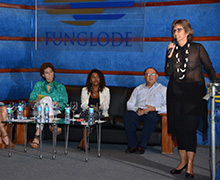news
“Dominican Republic is the eighth country most vulnerable to climate change” According to Cedano
November 4, 2015
This statement was made by Claudia Cedano, part of a group of Dominicans trained by Al Gore (winner of the 2007 Nobel Peace Prize), during the panel “Dominican Republic: The Climate Reality Project and COP21 Challenges and Opportunities.”
“Several scientific studies have shown that the Dominican Republic is the eighth country most vulnerable to the effects of climate change,” said Claudia Cedano, founder of the blog
Cultura Green, this Tuesday, November 3, during the panel “Dominican Republic: The Climate Reality Project and COP21 Challenges and Opportunities.”
The panel was organized by Fundación Global Democracia y Desarrollo (Funglode) and its sister institution in the United States, the Global Foundation for Democracy and Development (GFDD), through its Center for Environmental and Sustainable Development Studies, the National Council for
Climate Change, the Clean Development Mechanism, and the Climate Change Reality Project.
In addition to Cedano, the panel included Ginny Heinsen, director of the 3Rs Program at the Center for Agriculture and Forestry Development (CEDAF); Diana Pimentel, chef and health coach; and Zoraida Ivonne Cid, director of the Let’s Do It Worldinitiative – all of whom are members of the group of Dominicans trained by Al Gore, former vice president of the United
States and 2007 winner of the Nobel Peace Prize. Also seated on the panel was Omar Ramírez, director of the Center for Environmental and Sustainable Development and vice president of the National Council for Climate Change.
The alteration of planet Earth’s hydrologic cycle, prompted by high temperatures and global warming, has resulted in many people losing their farms and products from the basic market basket becoming scarce, “due to the current drought,” noted Cedano.
“Raising your voice, opening the debate, being more committed, making energy-saving decisions, recycling, consuming responsibly, and not giving up,” are all part of the proposals presented by the CEDAF director by which each person can contribute to the improvement of the environmental problem.
The director of the Let’s Do It World initiative noted that more gases are being emitted than the ozone layer can retain. “We are
the ones to blame for not reducing our carbon emissions,” she argued.
Cid proposed the use of renewable energies (such as wind and solar) to contribute to the reduction of global warming. “Within 20 years, eighty percent of the population will live in regions connected to one of these systems,” added the Cultura Green blogger.
She cited studies indicating that the most promising solar markets in Latin
America are Brazil, Chile, Mexico, Peru, and the Dominican Republic, and affirmed that “implementing renewable energy in the country could generate approximately 10,000 jobs.”
Pimentel, based on her experience as a chef and health coach, spoke on “How climate change affects food and agriculture,” highlighting that as a result of global warming “we have less production and bigger increases in prices.”
“Climate change is also prompting an increase in blights and illnesses in plants, which reduces food production,” said Pimentel.
For her part, Heinsen, an environmental activist who moderated the panel, shared an alarming statistic: due to the changes happening on the planet “half of our animals have been lost in the last 40 years.”
Ramírez spoke about the challenges and opportunities of the 21st
Conference of Parties to the United Nations Framework on Climate Change later this year (COP21/CMP11).
He noted that “the COP21 is questioning the lifestyle and development models on which humanity has sustained itself over the last 65 years, which as a result is sparking a huge international debate.”







